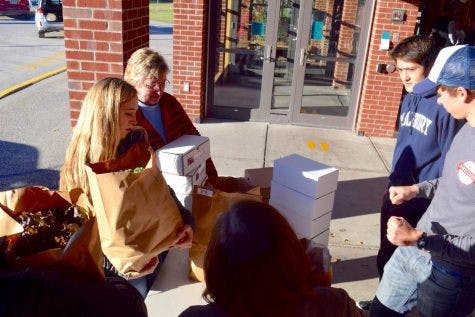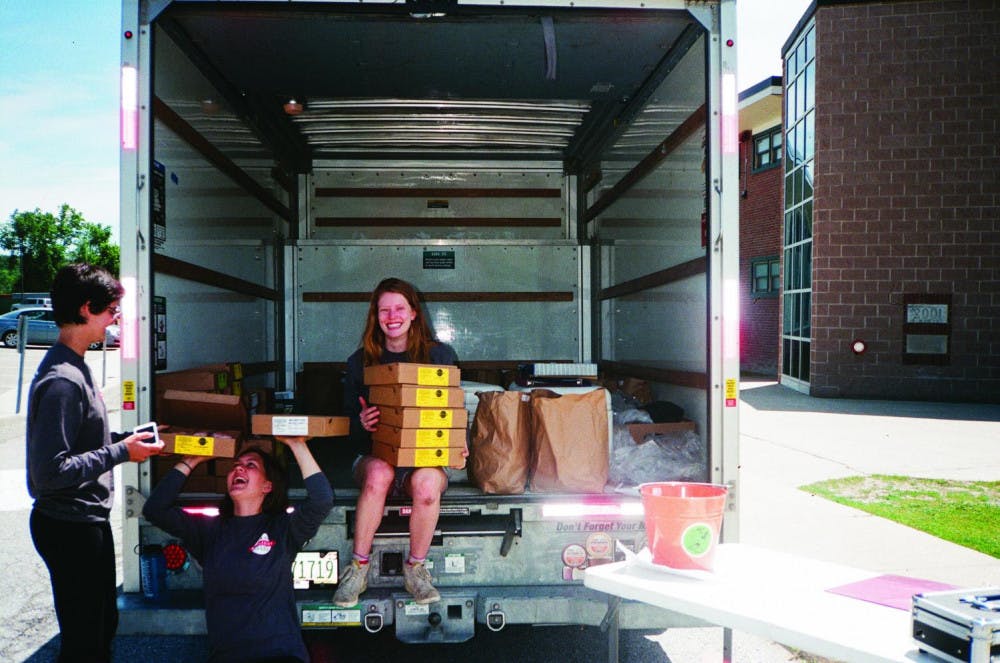After six years of grocery delivery service, Middlebury Foods ran its final routes last weekend. Unable to financially support its business model, it will no longer continue as a 501(c)(3) nonprofit organization.
Since the fall of 2013, Middlebury Foods has operated monthly deliveries of fresh and local foods to six locations around Addison County. Customers would place orders ahead of time, then student volunteers would pack and deliver groceries to the six sites.
Close to the beginning of every month, Middlebury Foods would conduct a ‘delivery weekend.’
“We would take all of the delivery food to our storage place in Shoreham, which had a big refrigeration house,” Middlebury Foods General Manager Kate Peters ’20 said.
Peters told The Campus that Middlebury Foods’ model worked due to volunteer work put in by students. The organization was entirely student-run, and was able to sell high-quality food at cheap prices because of its low fixed costs: a U-Haul rental, paying for refrigeration space, and buying the food itself.
Even with such low operating costs, the organization began to struggle to meet the needs of customers. This was not always the case. In March 2016, Middlebury Foods was featured in a Vermont Public Radio story that created a boom in orders from Middlebury residents.
Charlie Mitchell ’18, a current Middlebury Foods board member, was working with the organization at the time of the VPR piece. Following the 2016 VPR story, Mitchell said, the number of families buying Midd Foods orders ballooned to almost 300, from the 80 families who were placing orders when Mitchell started volunteering.
“We expanded our offerings beyond vegetables and meat to more of a full grocery service,” he said. “We started selling bread and pasta and cheese, a lot of it from local suppliers.”
While this growth in interest helped promote Middlebury Foods’ goal of providing locally sourced foods at a lower cost, Mitchell said that orders began to decrease slowly following their 2016 spike. Bea Lee ’20.5, a finance manager and one of Middlebury Foods’ 2019 summer managers, said that as orders fell, it became harder to sustain their delivery model, which relies on wholesale purchasing.
“The idea is to buy wholesale food or local products that we are able to resell close to the wholesale price,” she said. “That system works well as long as you know you can order in these wholesale block quantities.”
Lee explained that as fewer people placed orders, it became harder to meet the exact needs of customer orders while purchasing units of wholesale products. As orders dwindled, bulk ordering made less financial sense.
Lee said that ultimately, it didn’t make sense to continue the delivery service.
“The fewer orders we had per month, the less sense it made for us to continue purchasing in this manner of wholesale,” she said. “That made us think and pause and reevaluate the model that we were using.”

Middlebury Foods customers were able to pick up delivered groceries at one of six offered locations across Addison County.
Lee, Mitchell and Matthew Sjogren ’20, an operations manager who worked alongside Lee this past summer as the other summer manager, all realized that the effort going into deliveries could be put elsewhere. Beyond being a retail operation for food delivery, Sjorgren said, Middlebury Foods presents an “alternative vision” for what a food system can look like.
“That vision, I think, is to connect people who are doing awesome agricultural work and to find a way to make that work more accessible to people who might not otherwise be a part of that system,” Sjorgren said.
Sjogren credited much of the success of Middlebury Foods to Mitchell, and said that the organization has lost the intensity introduced by the former general manager and board member.
For Mitchell, the decision to stop deliveries had to do more with the goals of the organization. He saw Middlebury Foods as an “anti-hunger organization” dedicated to alleviating food insecurity in Addison County, with Middlebury Foods’ wholesale buying, limited markups and volunteer work as the model for achieving that goal.
“It just turned out that the benefit was relatively marginal,” Mitchell said.
In addition, Mitchell said that the deliveries did not necessarily serve those experiencing food insecurity, as would be the aim of a traditional food bank.
“When we could take SNAP (Supplemental Nutrition Assistance Program, formerly known as food stamps), the use of SNAP among our customers was about proportional to the enrollment in our community,” he said.
Mitchell added that SNAP is not a reliable benchmark of food insecurity because many households that could benefit from the program might not be enrolled. He cited personal financial considerations and timing as reasons why some might not use Middlebury Foods.
Mitchell said that Middlebury Foods’ goals extended beyond addressing food insecurity. Rather, he saw it as an organization focused on creating a community around a better food system and provide food at low cost in the process.
Coupled with the high turnover rate of college students, the nonprofit, wholesale model under which Middlebury Foods operated became hard to sustain.
“It became more to juggle than we could handle,” Mitchell said. Many college organizations - including Middlebury Foods - struggle with leadership turnover and management changes, he said.
Peters estimated that between 50 and 60 customers placed orders for the final delivery. Though the organization won’t continue as a 501(c)(3), Peters hopes that Middlebury Foods buyers and student volunteers alike will seek to involve themselves in conversations about food systems and access in different, more effective ways.
“I think most of the people who bought from us [did so] because of the interaction with the students and interaction with the community,” she said. “I hope that we continue that in some other form, but it just doesn't really make sense to operate as a 501(c)(3) nonprofit.”
Sjogren agreed that Middlebury Foods, though finished with deliveries, will continue to exist as an organization interacting with the local food system. After having conducted its final deliveries, the organization will donate its remaining financial assets to HOPE and John Graham Shelter.
“The physical retail operation is gone,” Sjogren said,“but I think that a broader vision very much remains and that the ethos of finding innovative ways to change the food system for the better is still there.”
Delivery teams and produce hauls: through the years
For six years, Middlebury Foods provided Addison County towns with a localand affordable food option. Let’s take a look.
[gallery ids="46029,46030,46031,46032,46033"]

Ariadne Will ’22 is a local editor for the Campus.
She has previously served as a staff writer, where she covered topics ranging from Middlebury’s Town Meeting to the College’s dance performances.
Will also works for her hometown newspaper, the Daily Sitka Sentinel, where she covers tourism and the Sitka Planning Commission.
She is studying English and American literature with a minor in gender, sexuality and feminist studies.




